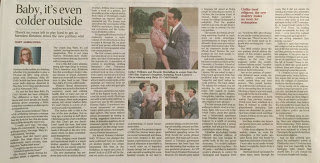Romance, ‘drunken seduction’ and #MeToo
Reading Time: 4 minutes
Janet Albrechtsen’s column in the current Weekend Australian warrants reading, if only to test the efficacy of your blood pressure medication.
The target of her opinion piece is the #MeToo movement and associated implications on what constitutes sexual harassment. While accepting that Harvey Weinstein-style abuse of power or Billy Cosby’s administration of drug-rape drugs, Albrechtsen denounces the demonization of less blatant or serious pressuring, which she describes as ‘harmless, sexy flirtatious fun’. Her argument is that in the resulting ‘clinical lexicon of sexual chemistry there is no room left for women or men to play hard to get’.
While apparently seeking to criticise some of the potential implications and excesses of #MeToo, Albrechtsen demonstrates a lack of empathy for victims of sexual harassment and appreciation that sexual harassment may take many forms and be destructive of lives even when it appears to be ‘minor’ and fun (for one party at the expense of the other).
Claiming to have survived the sexist excesses of undergraduate sexual pressures, Albrechtsen shows no sympathy for those who were and continue to be scarred by the misogynistic behaviour of men who see women as sexual conquests and objections to their advances as challenges to be overcome by whatever means are required. Such men, apparently go on to become the doctors who demand sexual favours from the reported 80% of doctors they supervise. They may also become the lawyers who consider harassment (including sexual harassment) of young (and especially female) lawyers, to be a part of a toughening-up process. After all, they say, if young lawyers can’t cope with the sexual advances of a senior lawyer, how will they cope with the cut-throat world of legal practice.
Today’s Sunday Mail reports the views of a ‘prominent’ Queensland criminal defence lawyer who argues that those charged with sexual assault while under the influence of drugs or alcohol should be entitled to use ‘reasonable belief’ as a defence. To do otherwise would, he suggests, be a ‘romance killer’ that risks criminalizing drunken seduction’. As his view is reported to be supported by numerous other criminal defence lawyers, it would seem that getting too close to sexual offenders runs the risk that you begin to think like them. Sexual harassment or assault is not romance! Harassment and sexual assault are not drunken seduction, unless we’re determined to return to the concepts of sexual interaction held by cavemen.
I’m baffled by Albrechtsen’s inability or unwillingness to distinguish between ‘playing hard to get’ and lack of consent to sexual harassment.
Playing hard to get is when the subject of affection or sexual advances choses to defer reciprocating the romantic or sexual advances, until such time as she deems it appropriate to reciprocate – not until she is forced into submission.
Sexual predators and misogynists often interpret a woman’s refusal as a sign that she is playing hard to get and view it to be their role to try harder. The public perception remains that by not accepting that no means no, men succeed in getting to yes with women they desire. That this is the case from time to time is an uncomfortable exception that needs to be conceded. However, what #MeToo highlights is that ‘no’ should mean ‘no’ unless both parties consent to a continuation of the approaches/attention. This is far removed from undesired approaches/behaviour, which ought to be presumed to be harassment in the absence of consent.
Albrechten’s comment are reminiscent of those made by women who having crashed through the gender glass ceiling show little regard for the cause of other women’s struggle that prevents them from also succeeding.
Albrechtsen appears to be sending a number of regrettable messages. First, she seems to be saying, ‘Lighten up, don’t be a prude. To get along in life you need to play by their rules’. As many successful women concede, in order to succeed they had to become ‘honorary men’.
Secondly, she fails to acknowledge that in many cases a woman may have no real choice to object to the harassment, particularly if her livelihood or career is at stake. It is in acknowledgement of this aspect of the equation, that we require guidelines so that recognition of inappropriate behaviour does not depend on the lodgment of a complaint. Thirdly, Albrechtsen appears to suggest that in contemporary romantic/sexual life, pestering another person into compliance, and weakening their refusal through repeated approaches is reality that #MeToo ignores. Unwanted – consent ok if unsure ask.
Where Albrechtsen’s remarks resonate favourably with me (although this in itself is of great concern to me) is that the current exposure and redress of sexual harassment leaves ‘no room for redemption’ of perpetrators. Banishment for life does seem to be extreme punishment.
Thus I would argue that if allegations of sexual harassment are proven, conceded by the harasser, responsibility accepted, legal consequences dished out, and undertakings to alter behaviour given, a perpetrator should be given the opportunity to resume their public life. This, I accept, may be difficult to stomach in view of lasting harm often occassioned to victims. However we must note that this is also the case even in major criminal offences against the persons.
For example, if the allegations against Geoffrey Rush are proven, and he does what is required to redress the harm caused to the victims, demonstrates an appreciation of why his actions were inappropriate and shows a determination not to repeat them, shouldn’t he be permitted to return to the work that we have admired until now?
(Visited 20 times, 1 visits today)

